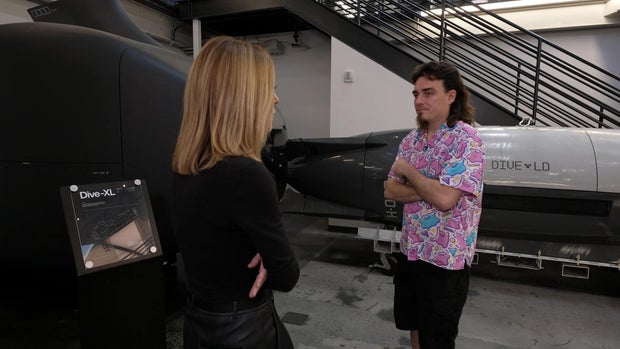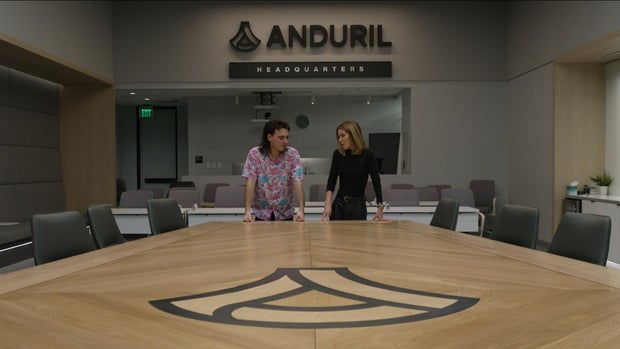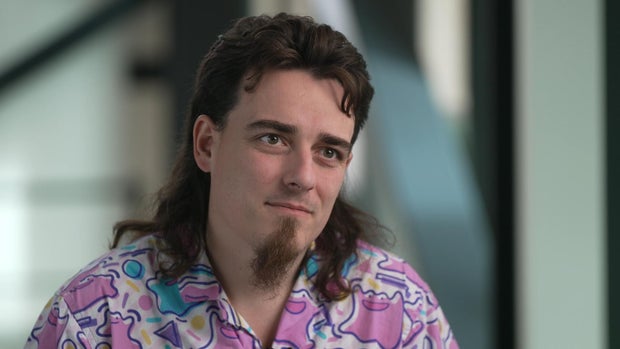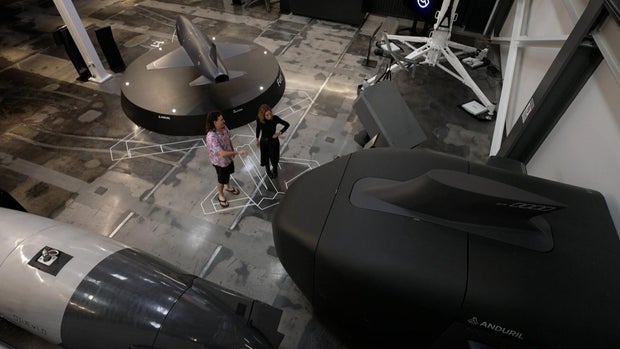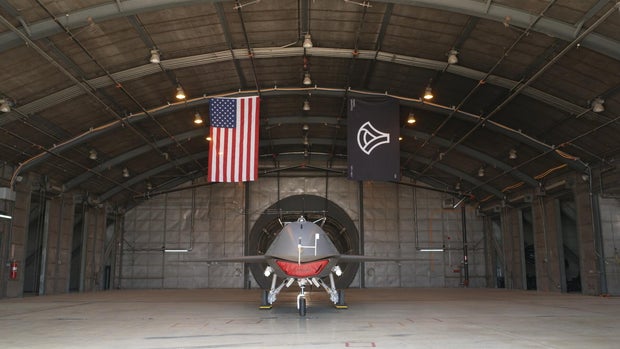Why Palmer Luckey thinks AI-powered, autonomous weapons are the future of warfare
By now, we've all heard about Elon Musk's efforts to reshape the U.S. government.
But tonight, we'll introduce you to another tech billionaire, one who's set his sights on radically changing the way the Pentagon buys and uses weapons.
His name is Palmer Luckey and he's the founder of Anduril, a California defense products company.
Luckey says for too long, the U.S. military has relied on overpriced and outdated technology. He argues a Tesla has better AI than any U.S. aircraft and a Roomba vacuum has better autonomy than most of the Pentagon's weapons systems.
So Anduril is making a line of autonomous weapons that operate using artificial intelligence. No human required.
Some international groups have called those types of weapons killer robots.
But Palmer Luckey says it is the future of warfare.
Palmer Luckey: I've always said that we need to transition from being the world police to being the world gun store.
Sharyn Alfonsi: Do we want to be the world's gun store?
Palmer Luckey: I think so. I think we have to.
Sharyn Alfonsi: Says the guy who sells weapons.
Palmer Luckey: See, I-- I agree it sounds self-fulfilling. But you have to remember, I also got into this industry because I believe that.
Palmer Luckey isn't your typical defense industry executive. His daily "uniform" – flip-flops and a Hawaiian shirt – is more suited for Margaritaville than the military.
But the 32-year-old billionaire is the founder of Anduril, whose line of American-made autonomous weapons looks like it came straight out of a sci-fi movie and whose slick marketing videos wouldn't be out of place in one.
There's the Roadrunner – a twin turbo jet-powered drone interceptor that can take off, identify, and strike. If it doesn't find a target, it can land and try again.
Anduril also makes headsets which allows soldiers to see 360 degrees in combat.
And there's this – it's an electromagnetic warfare system that can be programmed to jam enemy systems, knocking out drone swarms.
It's not some futuristic fantasy. Anduril's systems are already being used by the U.S. military and in the war in Ukraine.
Palmer Luckey: We shouldn't be sending our people to stand in other countries, putting our men and women, our sons and daughters at risk for the sovereignty of other nations.
Sharyn Alfonsi: So you'd rather have an American-made product in their hands than our soldiers over there?
Palmer Luckey: Absolutely. Every time. And I think that that's one of the reasons that autonomy is so powerful. Right now, there are so many weapon systems that require manning. You know, if I can have one guy command and con-- controlling 100 aircraft, that's a lot easier than having to have a pilot in every single one. And it puts a lot fewer American lives at risk.
To be clear, "autonomy" does not mean remote controlled.
Once an autonomous weapon is programmed and given a task, it can use artificial intelligence for surveillance or to identify, select and engage targets. No operator needed.
Sharyn Alfonsi: It's a scary idea to some people.
Palmer Luckey: It's a scary idea, but, I mean, that's the world we live in. I'd say it's a lot scarier, for example, to imagine a weapons system that doesn't have any level of intelligence at all. There's no moral high ground to making a land mine that can't tell the difference between a school bus full of children and Russian armor. It's not a question between smart weapons and no weapons. It's a question between smart weapons and dumb weapons.
Luckey showed us how those so-called "smart weapons" can be synchronized on Anduril's AI platform. It's called Lattice.
Lattice collects data from various sensors and sources, including satellites, drones, radar and cameras.
Allowing, he says, the SI to analyze, move assets and execute missions faster than a human.
Palmer Luckey: If you were having to require the human operator to actually map every single action and say, "Hey, do this. If that, then this." It would take so long to manage it that you would be better off just remotely piloting it. It's the AI onboard all these weapons that makes it possible to make it so easy.
Sharyn Alfonsi: There are lots of people who go, "Oh, AI. I don't know. I don't trust it. It's gonna go rogue."
Palmer Luckey: I would say that it is something to be aware of. But in the grand scheme of things, things to be afraid of, there's things that I'm much more terrified of and I'm a lot more worried about evil people with mediocre advances in technology than AI deciding that it's gonna wipe us all out.
Luckey says all Anduril's weapons have a "kill switch" that allow a human operator to intervene if needed.
But the secretary general of the United Nations has called lethal autonomous weapons, quote "politically unacceptable and morally repugnant."
Sharyn Alfonsi: When people say to you, "Look, it's evil." How do you respond to that?
Palmer Luckey: I usually don't bother because, if I am gonna argue with them, I-- I usually poke it. I'm like, "Okay, so do you think that NATO should be armed with squirt guns or-- or slingshots? How 'bout sternly worded letters? Would you like that? Would you like it if-- if NATO just-- they just have a bunch of guys sitting at typewriters, a thousand monkeys writing letters to Vladimir Putin begging him to not invade Ukraine?" Our entire society exists because of a credible backstop of violence threatened by the United States and our allies all over the world. And thank goodness for it.
It might sound flip but part of Palmer Luckey's philosophy is that autonomous weapons ultimately promote peace by scaring adversaries away.
Palmer Luckey: My position has been that the United States needs to arm our allies and partners around the world so that they could be prickly porcupines that nobody wants to step on, nobody wants to-- to bite them.
Sharyn Alfonsi: In your mind, is it enough just to have all these things as deterrents? Or do they have to be deployed and used.
Palmer Luckey: They have to believe that you can use them.
By the end of this year, Anduril says it will have secured more than $6 billion in government contracts worldwide.
Sharyn Alfonsi: When you first came into this space, and you're a t-- a tech guy in-- a Hawaiian shirt, and you're walking into the Pentagon maybe in flip-flops, I don't know. Were you welcomed with open arms?
Palmer Luckey: There were a very small number of people who welcomed me with open arms, and everyone else thought that I was nuts.
Nuts, because there hasn't been a new company in the defense industry – in a significant way – since the end of the Cold War.
For decades, five defense contractors, called "the primes," have dominated the industry.
Typically, the "primes" present an idea to the Pentagon. If the Pentagon buys it, the government pays for the company to develop it. Even if it's late or goes over budget.
Luckey started Anduril to flip that procurement structure on its head.
Palmer Luckey: The idea behind Anduril was to build not a defense contractor but a defense products company.
Sharyn Alfonsi: What's the difference?
Palmer Luckey: Contractors in general are paid to do work. Whether or not it succeeds. A products company has a very different mentality. You're putting in your own money. You're putting in your own time. My vision was to build a company that would show up not with a PowerPoint describing how taxpayers are gonna pay all my bills but with a working product where all the risk has been baked out. It will work for enough things that you can save our country hundreds of billions of dollars a year.
It may not surprise you that Palmer Luckey's father was a car salesman.
His mother took on the role of homeschooling him and his three sisters.
Luckey says he was fascinated by electronics and spent a lot of time tinkering in his parents' garage in Long Beach, California.
By age 19, his tinkering turned into Oculus, the virtual reality company.
And at 21, Palmer Luckey fulfilled every young founder's dream when he sold Oculus to Facebook for $2 billion.
"The wonder-kid" graced the covers of magazines, but two years later, he was fired from Facebook.
Sharyn Alfonsi: Why did you get fired?
Palmer Luckey: Well, you know, everyone's got a different story, but it boils down to I gave $9,000 to a political group that was for Donald Trump and against Hillary Clinton. To be a Trump supporter in 2016-- you know, this was at the height of the election insanity and derangement in Silicon Valley. And so I think that a lot of people thought back then that you cou-- you could just fire a Trump supporter.
Facebook founder Mark Zuckerberg has denied that Luckey was fired for his political views.
Sharyn Alfonsi: What do you think now when you see those tech leaders, Mark Zuckerberg, lined up behind President Trump now at his inauguration?
Palmer Luckey: I am inclined to let every single one of them get away with it. Look--
Sharyn Alfonsi: What do you mean get away with it?
Palmer Luckey: Coming around to a point of view that is more aligned with the American people broadly I think is good for the country. I think it is not good for you to have techno-corpo elites that are radically out of step with where the American people are.
In 2017, Luckey says he left Silicon Valley, with hundreds of millions of dollars in the bank and a chip on his shoulder.
Palmer Luckey: I was fired at the height of my career, you know, my gears were ground, and I really wanted to prove that I was somebody, that I was not a one-hit wonder, and that I still had it in me to do big things.
He says he thought about starting companies to combat obesity or fix the prison system but ultimately decided to break into the defense industry.
Sharyn Alfonsi: Have you run into any people who don't take you seriously because you were never in the military?
Palmer Luckey: I-- I don't think so. I think I owe that to the James Bond franchise. Everyone in the military has seen James Bond movies and they all like Q, right? I'm the wacky gadget man. I'm the guy who types on the computer and pushes up my glasses, and then gives them a strange thing to help them accomplish their mission.
And this is his laboratory. Anduril's 640,000 square foot headquarters in Costa Mesa, California.
It's a mix of high-tech carpentry and robotic engineering. A sign on the floor pokes fun at the boss's shoe choice.
But Luckey wanted to show us something off campus. We hopped in his 1985 Humvee.
The billionaire told us he also owns a decommissioned Black Hawk helicopter, a 48-crew submarine, and a Navy speedboat.
In Dana Point, we took a ride 15 minutes off the coast to see the largest weapon in Anduril's arsenal: this submarine. It's called the Dive XL. It's about the size of a school bus and works autonomously.
Palmer Luckey: It's not remote-controlled by this computer. It's doing it on the brain, on the submarine itself. So if I told it to go off and perform some mission that's months-long, like, "Go to this target, listen for this particular signature, and if you see this signature, run, if you see this one, hide, if you see this one, follow it." It could do that all on its own without being detected, without communicating with it.
Anduril says the Dive XL can travel 1,000 miles fully submerged. Australia has already invested $58 million in the subs to help defend its seas from China.
But Anduril's most anticipated weapon has been closely guarded until this month. Hidden inside this hangar, Anduril's unmanned fighter jet called "Fury." There is no cockpit, or stick or rudder because there's no pilot.
Palmer Luckey: The idea is that you're building a robotic fighter jet that is, you know, flying with manned fighters and is doing what you ask it to do, recommending things be done-- taking risks that you don't want human pilots to take.
Fury represents a big turning point for the company. Anduril was viewed by some inside the defense industry as a "tech-bro" startup until it beat out several of the prime defense contractors to make an unmanned fighter jet for the Air Force.
Fury is scheduled to take its first test flight this summer. If selected by the Pentagon it, like all Anduril products, will be produced in the U.S.
Palmer Luckey: The war games say we're gonna run out of munitions in eight days in a fight with China. If we have to fight Iran, and China, and Russia all at the same time, we are screwed.
Sharyn Alfonsi: If we go to war, right--
Palmer Luckey: Yep.
Sharyn Alfonsi: --your version of what Anduril's place is in-- in a conflict--
Palmer Luckey: Yep.
Sharyn Alfonsi: --how do you view it?
Palmer Luckey: I think what we're gonna be doing is first connecting a lot of these systems that otherwise would not have been talking to one another.We're gonna be making large numbers of cruise missiles, large numbers of fighter jets, large numbers of surface and subsurface systems. I guess I would hope that Anduril is making most of the stuff that's being used on day nine, day 10, day 11, day 100. I think a lot of that is gonna be coming out of our factories ever-- after everything else has run dry.
Produced by Lucy Hatcher. Associate producer, Jessica Kegu. Broadcast associate, Erin DuCharme. Edited by Robert Zimet.

